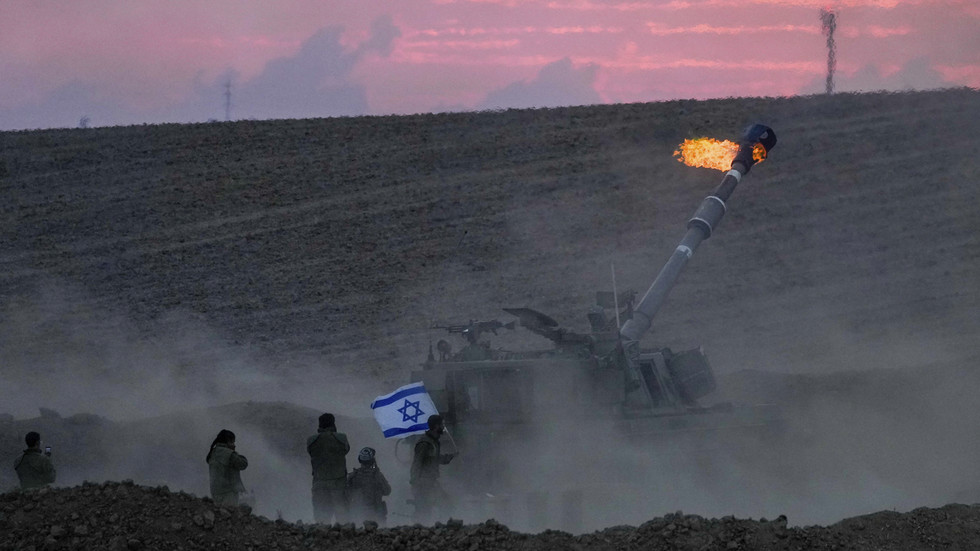
The resolution of multiple regional problems hinges on whether the Israel-Gaza conflict can be de-escalated
By Murad Sadygzade, President of the Middle East Studies Center, Visiting Lecturer, HSE University (Moscow)
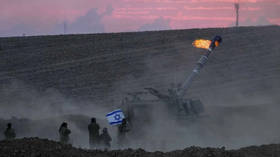
FILE PHOTO: An Israeli mobile artillery unit fires a shell from a position near the Israel-Gaza border. © AP Photo/Maya Allerruzzo
More than 100 days have passed since the latest major escalation in the Palestinian-Israeli conflict. On October 7, 2023, the Izz ad-Din al-Qassam Brigades, commonly considered the military wing of the Hamas organization, attacked Israel and announced the launch of ‘Operation Al-Aqsa Flood’.
As a result of the attack, up to 5,000 rockets were fired at Israel and thousands of militants broke through the Israeli border. Authorities in the Jewish state temporarily lost control of several kibbutzim. In total, according to official figures, about 1,200 Israelis were killed and over 240 people taken hostage, including civilians and military and security personnel.
By mid-afternoon of the same day, the Israel Defense Forces (IDF) had begun airstrikes on Gaza, and by nightfall, the Israeli Security Council had unanimously approved a ground operation in the Palestinian enclave, as announced by Prime Minister Benjamin Netanyahu in an address to the nation. He promised to “turn into ruins” all the places where Hamas members are “hiding” and called on civilians to leave Gaza. The Israeli government responded to the attacks by announcing the launch of ‘Operation Iron Swords’, which included a set of actions to eliminate the threat from Hamas. Airstrikes on Gaza began immediately, but the ground operation was delayed as Israel and its allies assessed the potential consequences.
Despite some experts’ predictions that the escalation would last no more than two or three weeks, over three months have now passed and there is not even a hint of a decrease in the intensity of the conflict. Overall since the start of the Israeli operation, the IDF has lost 160 soldiers, which is more than during the 2006 Lebanon war. Meanwhile, on the Palestinian side, 23,084 people have been killed, 58,926 injured, and 7,000 are missing as of mid-January, according to the Hamas-run Gaza Health Ministry.

Read more
The death toll will continue to rise, with the international community unable to reach a consensus and pressure the parties to the conflict to cease fire and move towards a diplomatic settlement. The reason for this is the high level of internationalization of the current clash between Palestinians and Israelis. The war in Gaza has become another geopolitical fault line, with Western states and Israel on one side, and Palestinians and countries of the Global South on the other.
What are the reasons for the current escalation?
It is incorrect to talk about what happened to cause the war in Gaza to break out in isolation. It is necessary to understand that the conflict between Palestinians and Israelis began in the mid-20th century, and it has not been resolved to this day. The radicalization of the Palestinian resistance has occurred in proportion to the aggression of the Israeli authorities against the inhabitants of the Gaza Strip and the West Bank. A thousand Palestinians are killed every year due to IDF military operations, but there is no significant response from global and regional players.
There is no real desire to resolve the conflict on the part of the authorities of the Jewish state, as the extreme right-wing government headed by Netanyahu is not ready for a compromise option and is unlikely to allow the creation of a full-fledged Arab state of Palestine. At the same time, the Palestinian resistance remains very diverse and fragmented, and no single force that could defend Palestinian interests in negotiations with Israel has emerged. The main players, Fatah and Hamas, are still in conflict with each other, having failed for a long time to unite their efforts to fight for the future of the Palestinian people.
But it is still worth considering the reasons that led to this latest major escalation in the long-running conflict. Note that in the years prior to the war, Netanyahu was in disgrace both for many citizens and allies in the West. In December 2022, he was able to win a special election in a coalition and return to the “throne” again. But the country was reeling from a long political crisis and economic difficulties that began because of the Covid-19 pandemic. The situation became more complicated because of Netanyahu’s judicial reform. Opposition forces began organizing mass protests across the country, which are taking place even now. Pressure was also growing from the US and other Western allies, who criticized Netanyahu for his “dictatorial” machinations and refusal to fully support Ukraine.
On the Palestinian side, too, there was plenty of build-up. Hamas was becoming increasingly popular among most of the population in the West Bank as Fatah, led by Mahmoud Abbas (Abu Mazen), the president of the Palestinian National Authority (PNA), lost its political clout. Abbas is 88 years old and has led the PNA for some 20 years. Fatah has been accused of corruption and failing to provide security and economic well-being for its citizens. Most importantly, according to many Palestinians, Abbas has done nothing to advance the issue of a full-fledged independent state.
At the same time, Hamas has made and continues to make many populist moves and statements that satisfy the aspirations of nationalists, religious extremists, young people, and those who have suffered from Israel’s actions. With one of the most extreme right-wing governments ever in power in Israel, unwilling to even consider the creation of an Arab state of Palestine, the Hamas position that the problem can be solved by force has increasingly resonated with the population.
There are also several reasons external to the region. It is no secret that the world order is in decline. Major world powers are settling their relations and do not care about small actors. The US is busy trying to harm Russia and China, but so far seems to have miscalculated, overestimating its ability to implement its plans through forceful instruments. The “medium-sized” actors have chosen to either join one of the blocs or adopt neutrality. Everyone is busy with their own problems, leaving “junior” powers like Israel to play their games and solve issues that would otherwise have caused too much international noise.
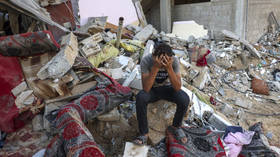
Read more
The crisis broke out suddenly, but the events were not unexpected. And here another thing happened. The world was quickly divided into supporters of one side or the other, but few spoke of the need for deconfliction. Russia was one such voice, but the US would not abide by Moscow’s role as a peacekeeper, blocking all of its initiatives on international platforms. This split intensified the current escalation. This is how the current Palestinian-Israeli crisis was internationalized, which will only exacerbate the situation.
Another important factor was the historic normalization process between Saudi Arabia and Israel. If Riyadh and West Jerusalem were to mend their relations, and if the custodian of Islam’s two holy sites recognized Israel, the Palestinian resistance would lose significant support from the Muslim Ummah. Contradictions between Israel and Iran remain, which also undoubtedly influence the deepening of the conflict, although Tehran shows restraint and does not want to get involved in major hostilities with Israel, and, more significantly, with the US.
The ‘gates of hell’ are open: The war in Gaza
The fertile ground for conflict was not limited to the basic causes discussed above. There were many different catalyzing factors. But the most pressing questions now are: How long will the conflict last, what is happening on the ground, and how will it all end?
In one of his speeches after the Al-Qassam Brigades attack, Israeli Defense Minister Major General Yoav Galant warned that “Hamas has opened the gates of hell in the Gaza Strip.” The Israeli authorities and military long postponed the start of the ground operation, realizing that it could indeed open a “portal to the underworld.” Moreover, their allies in Washington were very reluctant to launch full-scale military action, as they understood the complexity of the situation and the potential interference of major players in armed clashes.
Netanyahu had his own plans. The ground operation began, and the US pulled its troops and navy into the region to discourage major players from intervening in the conflict. But Washington failed to realize that none of the large or small regional countries were ready for open military action. This did not stop various proxy groups in the region from acting against the US and Israel. Iran, being a clear antagonist to Israel and Western countries active in the region, has been very restrained and has shown that it does not want open warfare. Even so, the series of events in the Gaza conflict demonstrated the desire of some participants to provoke Iran’s full-scale involvement in military action.
An Iranian military adviser, General Reza Mousavi of the Islamic Revolutionary Guard Corps, was killed in Syria. Then the US military struck Baghdad, killing Talib Al-Saidi, commander of the Shiite Harakat Hezbollah al-Nujaba Popular Militia Forces. The terrorist attack in Iran’s Kerman on January 3 – a series of two explosions at the city’s cemetery during a ceremony marking the anniversary of the assassination of Qasem Suleimani – killed at least 200 people. Although members of the Islamic State terrorist organization have claimed responsibility, the Middle Eastern public and authorities in Iran are convinced that Israel and its Western allies were behind it.
On January 16, Iran’s Islamic Revolutionary Guard Corps (IRGC) launched missile strikes on targets in Syria’s Idlib province as well as in the Iraqi Kurdistan Region capital of Erbil. The explosions occurred near the US consulate and US military bases. According to Kurdish authorities, four people were killed and six injured in the attack. Washington, for its part, said no US citizens were injured. Such a move by Iran showed that the situation is at the limit and escalation has increased markedly.
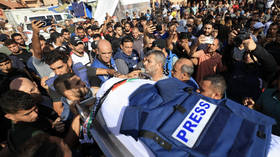
Read more
No less complicated is the situation with the Ansar Allah movement in Yemen, or the so-called Houthis, who on a regular basis launch rockets and UAVs in the direction of Israel, as well as block the Gulf of Aden for the passage of ships connected with Israel and its Western allies. The US has assembled a coalition for ‘Operation Prosperity Guardian’ in response to the group’s actions and there has even been talk of a possible ground intervention in Yemen to fight the Houthis, but everyone realizes that won’t be easy. Continued attacks by the Houthis on commercial ships and a firefight with US warships in the Red Sea led to American and British missile strikes on Ansar Allah positions in Yemen. Thus, the Middle East came another step closer to a region-wide war.
Closer to Israel’s borders, there is Lebanon’s Hezbollah. The IDF periodically strikes southern Lebanon, in what is generally seen as a violation of international law – to the point that West Jerusalem appears to be actively trying to pull Hezbollah and the whole of Lebanon in a full-fledged war. While Hezbollah has been taking some steps against Israel, they are restrained and remain limited to cross-border skirmishes and aggressive statements. The situation is worsening considering the recent Israeli attack on Beirut, the capital of Lebanon, which killed Saleh al-Arouri, deputy head of the political bureau of the Palestinian Hamas movement.
Turning to Gaza itself, the “gates of hell” indeed seem to have been opened there. In an area of 365 square kilometers, some 2 million people are experiencing a humanitarian catastrophe. The death toll is rising every day, but the IDF ground operation is unlikely to end any time soon. To eliminate Hamas, Israel will have to destroy an idea, not something tangible. Besides, the Al-Qassam Brigades have been preparing for such a scenario of confrontation with Israel for years. The IDF has already run into significant difficulties. Even though the Israelis officially control the northern part of the enclave, there is still fighting in those territories.
What might be next and where will it all lead?
“This war has complex objectives and is being fought in complex territory. The war in the Gaza Strip will last for many more months,” Israel Defense Forces Chief of General Staff Herzi Halevi said back on December 26. It’s true. The war will be long, even more so if proxy groups become increasingly involved. The Jewish state bears substantial financial and reputational costs and will be forced to wind down the military operation sooner or later, but it seems that it is in the best interests of Netanyahu and the entire army command to continue as long as they can. Once the escalation ends, all the top officials will likely be brought to justice, in particular Netanyahu, who is still facing four corruption charges and massive opposition to his government’s judicial reforms. So, it’s either war or prison.
The US under President Joe Biden’s administration will protect Israel, but not Netanyahu, with whom the Democrats do not have a very warm relationship. On the other hand, Donald Trump’s potential rise to power could further inspire Netanyahu to act decisively and harshly. But for this scenario the Israeli PM needs to hold on for at least another year. In the meantime, we will see increasing pressure on Netanyahu from Washington, but it will all be through closed channels and not for the public eye.
International public opinion is exerting strong pressure on the Israeli authorities with rallies in defense of peaceful Palestinians all around the world. The information agenda at the global level is clearly on the side of the Palestinians, so Israel needs to do something about it, otherwise it will only get worse. The same is true in the region. “The Arab Street” is very empathetic for its “Palestinian brothers”, increasing pressure on the respective governments to act more decisively and harshly against Israel.
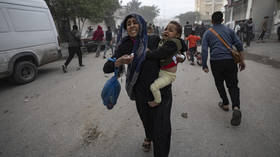
Read more
The right-wing government of Netanyahu is fixated on the idea that Jewish settlements in the occupied Palestinian territories will expand. Given the unconfirmed reports of Israel’s negotiations with various countries to accept Palestinian refugees, it can be assumed that the current authorities are considering a complete “Israelization” of the Palestinian territories. West Jerusalem, under its nationalist government, will continue the policy of squeezing the Palestinians out of Gaza and the West Bank. This will necessitate a protracted military operation, which could backfire and eventually trigger a major and bloody regional war, because at any moment unexpected flare-ups may exhaust the limit of restraint and patience of several players who will move to more active involvement.
Undoubtedly, the above scenario is a disaster. The best option would be a cessation of hostilities and a restart of political dialogue. Negotiations with the participation of guarantors should be based on UN resolutions and lead to the establishment of a full-fledged Arab state of Palestine and guarantees of security and universal recognition of the existence of the Jewish state of Israel. Unfortunately, the scenario of a peaceful settlement is unlikely, as global political turbulence and several other factors prevent the parties to the conflict from reaching a common denominator.
Predicting the outcome of conflicts is a complex process, especially in the Middle East, where several external and internal factors play an important role simultaneously. One thing is certain: the path of violence in this conflict will not lead to peace and prosperity but will only further radicalize the region and create fertile ground for the activity of destructive elements. The Palestinian-Israeli conflict is often referred to as just the “Middle East conflict”, and it is an appropriate name because on its resolution hinges the solution to a significant number of problems in the entire Middle East and North Africa region.




